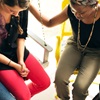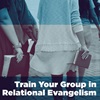Click here for Part Two of this article.
It all started in 313 A.D.
The early church lived in community every day (Acts 2:46), encouraging one another daily (Hebrews 3:13). The New Testament reveals the relational nature of the church in that day. In times of both peace and persecution, the believers did life together as a matter of course.
But the life, or lifestyle, of the church changed drastically with the conversion of the Roman Emperor Constantine in 313 and the eventual legalization and political proliferation of Christianity. One of the more obvious changes was the new ability of Christians to meet publicly without fear. The construction of official church buildings (basilicas) followed, and the subsequent differentiation between clergy and laity transformed the "church"—the Body of Christ living in relational community—into a place-based, meeting-centered religion.
And what started in 313 A.D. still lives in much of today's church.
Meetings themselves are not the main issue. The importance of "meeting together" has been a high value from the beginning. Hebrews 10:25 says: "Let us not give up meeting together, as some are in the habit of doing." But this command was given in the context of—and never separated from—how the believers lived in community together: "And let us consider how we may spur one another on toward love and good deeds. Let us not give up meeting together, as some are in the habit of doing, but let us encourage one another and all the more as you see the Day approaching" (vv. 24–25).
The church today needs more than small groups and small-group meetings. We need a new reformation—a restoration of the original fundamental nature of the church: relationship. In his excellent book The Relational Way, Scott Boren says: "The American church has to learn not only how to do small groups, but also how to do relationships." We need to learn not only how to meet in community but also, and even more importantly, how to live in community.
How? That is a big question, and one I can't answer completely in this brief article. But I do want to suggest several ideas I think are key for this reformation to take place in the church today.
Leaders Model Relational Community
Every move of God that I can think of has started with a leader who has heard from God. Abraham, Moses, the prophets, Peter, Paul, Martin Luther, John Calvin, Alexander Campbell—the list goes on and on.
So who will God raise up today to lead this restoration of the relational church? I believe he is already at work, calling men like Joseph Myers, Scott Boren, Larry Crabb, and Randy Frazee, for example. This restoration will also take men and women in local churches everywhere to hear from God and to commit their lives to his relational kingdom—living in community.
Leaders in local churches can lead a revival of biblical community by modeling it. That means making relationship-building a top priority. But that does not mean just "being in a small group." Small-group participation may be a good vehicle for building strong, deep, real relationships, but it does not necessarily mean the leader is modeling what radically real relational community looks like.
I believe church leaders should start not with getting into a small group, but in building strong relationships. If you are a church leader, begin with prayer. Ask God to send you some people with whom he wants you to develop relationships. Ask him to open your spiritual eyes so you know those people when they are right in front of you. Then spend time investing in those relationships. Eventually, these relationships may lead to a small group, but the important thing is the relationships themselves.
A few cautions:
- Do not look at these relationships as ways to build your ministry. God will build your ministry as you build relationships. Just build the relationships.
- Do not push an agenda on your group of friends. Allow God to lead the way as you spend time together and invest in your relationships. As God grows your heart for relationships (and you therefore become more and more a man after God's own heart), he will use those relationships to grow all of you spiritually. For example, rely on the Holy Spirit to tell you when to move these friendships into study of the Bible.
- Do not get into a small group just to be able to say you are in a small group, or because you know intellectually that small groups are the way to grow your church. People will see through this, and it will not lead you to restoring God's relational church.
Modeling biblical community also means more than just preaching about community. Your words must follow your actions. Begin by building relationships. That may mean you need to learn how to share honestly, trust, and be accountable with at least a few other people. This may not be easy for many in ministry, but if we are going to bring change, we must learn to do it. Your teaching will overflow out of your own changing heart, and that will mean much more to people than mere words.
Biblical community also goes beyond superficial friendship. Many of us in ministry are very good at staying at the surface level, but the relational way involves becoming increasingly real with a few others—practicing the New Testament commands of how we are to relate to one another, sharing our own struggles and hurts as well as our joys and successes.
Finally, modeling biblical community does not mean relating equally to everyone in the church. As a leader, you are allowed to make several close friends, and that does not mean you are being unfair to everyone else! Remember that Jesus unapologetically related most closely with his inner circle of Peter, James, and John.
One of the reasons that many pastors do not invest more in deeper relationships is simply because they are too busy "doing God's work"—or, more likely, "doing church work." But your job is "to prepare God's people for works of service, so that the body of Christ may be built up" (Ephesians 4:13), not to do all the ministry of the church. When we do ministry the way God intends us to (and directs us to), we will certainly have time to be in relational community as he created us to be.
Build a Practical Theology of Community
As a church leader, it will be good for you to study what Scripture, as well as sociology, says about community. Take some time to read and reflect on the importance of community in the church.
Two excellent books I recommend on the topic of a biblical theology of community are Biblical Foundations for Small Group Ministry by Gareth Icenogle and Community 101 by Gilbert Bilezikian. Another smaller book that touches on this topic is Community Life 101 by Randall Neighbour.
A good book from a sociological viewpoint of relational community is Connecting by Larry Crabb. A slightly older book that approaches the topic from a church leadership viewpoint is Church Without Walls by Jim Petersen. One more book that I believe is a must-read is The Relational Way by M. Scott Boren.
Use these books—and Scripture itself, of course—to help you think about and then communicate why community is important and what it really is.
Note: This is Part 1 of a two-part article. Next week, Mike will explore two more keys for unlocking a radically relational church.
—Mike Mack; copyright © 2009 by the author and Christianity Today.









